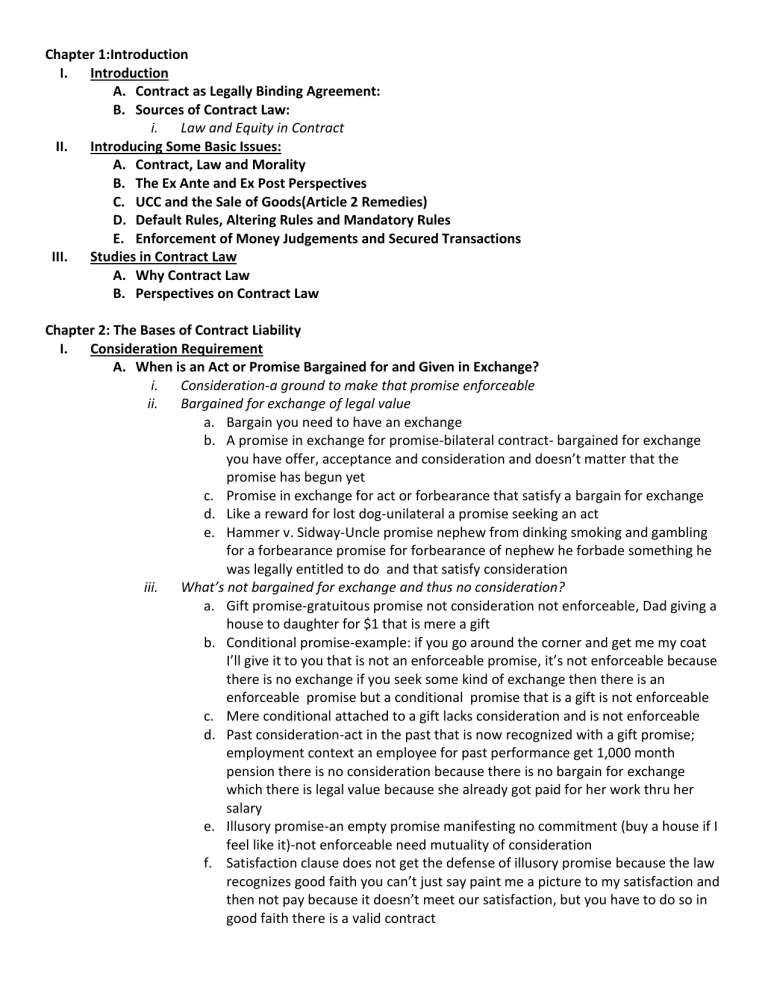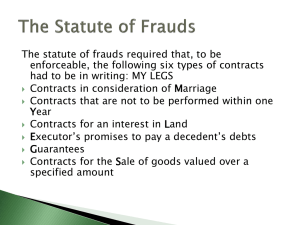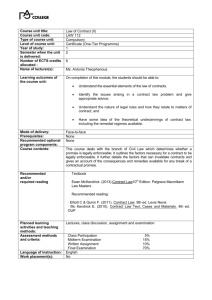
Chapter 1:Introduction I. Introduction A. Contract as Legally Binding Agreement: B. Sources of Contract Law: i. Law and Equity in Contract II. Introducing Some Basic Issues: A. Contract, Law and Morality B. The Ex Ante and Ex Post Perspectives C. UCC and the Sale of Goods(Article 2 Remedies) D. Default Rules, Altering Rules and Mandatory Rules E. Enforcement of Money Judgements and Secured Transactions III. Studies in Contract Law A. Why Contract Law B. Perspectives on Contract Law Chapter 2: The Bases of Contract Liability I. Consideration Requirement A. When is an Act or Promise Bargained for and Given in Exchange? i. Consideration-a ground to make that promise enforceable ii. Bargained for exchange of legal value a. Bargain you need to have an exchange b. A promise in exchange for promise-bilateral contract- bargained for exchange you have offer, acceptance and consideration and doesn’t matter that the promise has begun yet c. Promise in exchange for act or forbearance that satisfy a bargain for exchange d. Like a reward for lost dog-unilateral a promise seeking an act e. Hammer v. Sidway-Uncle promise nephew from dinking smoking and gambling for a forbearance promise for forbearance of nephew he forbade something he was legally entitled to do and that satisfy consideration iii. What’s not bargained for exchange and thus no consideration? a. Gift promise-gratuitous promise not consideration not enforceable, Dad giving a house to daughter for $1 that is mere a gift b. Conditional promise-example: if you go around the corner and get me my coat I’ll give it to you that is not an enforceable promise, it’s not enforceable because there is no exchange if you seek some kind of exchange then there is an enforceable promise but a conditional promise that is a gift is not enforceable c. Mere conditional attached to a gift lacks consideration and is not enforceable d. Past consideration-act in the past that is now recognized with a gift promise; employment context an employee for past performance get 1,000 month pension there is no consideration because there is no bargain for exchange which there is legal value because she already got paid for her work thru her salary e. Illusory promise-an empty promise manifesting no commitment (buy a house if I feel like it)-not enforceable need mutuality of consideration f. Satisfaction clause does not get the defense of illusory promise because the law recognizes good faith you can’t just say paint me a picture to my satisfaction and then not pay because it doesn’t meet our satisfaction, but you have to do so in good faith there is a valid contract II. g. USS article 2 output and input those contract do contain consideration they do fulfil all requirements your party Is required to do h. Exclusive agency contract-one party agrees to represent a band this is not an illusory contract must exercise best efforts to do what exclusive agent would do whatever reasonable agent( wood v. Lady Duff Gordan) i. Modification-common law and article 2 differ j. Common law says there must be new consideration in order to be a valid modification k. Article 2- all modification require goof faith if l. Preexisting duty rule -doing what you are already legally obligated to do is not consideration to pay you for something you already agreed to do otherwise violation of contract example Alaskan fisherman) m. Exception to pre existing See new or different consideration offer (agreeing to do more work etc.) Honest dispute over what dispute was (didn’t think you had to pave part of the barn not just driveway that is enforceable ) Unforeseen circumstance exception at the time of formation(need more money because you find out more work than was foreseen at time of formation) iv. What is legal value? a. ere possibility of value is enough if you agree to buy a patent and then it turns out that its worthless that is b. courts look to the nominal consideration B. Intent to Contract and the Seal? i. Nominal Consideration-will not support a contract sham transition joke transaction c. A house in exchange for a dollar d. Schell v. nell -not bargained for exchange e. Mere possibility of value is enough ii. The Seal iii. The Model Written Obligation Act C. Moral Obligation i. Statue of Limitations, Obsolete Debt and Partial Payment Revival ii. Consideration and Moral Obligation iii. Restatement 86 and the Future of Moral Obligation D. Mixed Motives and Adequacy of Consideration i. Adequacy of Consideration ii. Court don’t require the adequacy of consideration a mere peppercorn will suffice to constitute consideration iii. Batsachs v. Demaches E. Preexisting Duty Rule F. Discretion, Mutuality, and Implied Obligations Substitute to consideration Alternative ground for consideration is Promissory Estoppel: Promise plus Unbargained for Reliance A. Elements i. Promise must be made ii. Promisor should reasonably expect that promissee will expect act or forbearance iii. Detriment or forbearance occurred iv. Justice requires enforcement B. C. D. E. F. G. H. I. J. v. Shorthorn -grandpa promise granddaughter not to work vi. Promissory Estoppel in Particular Contexts Promissory Estoppel and the Choice of Remedies Promises to pay illegal obligation already barred by law-new promise to pay half is enforceable if in writing or part performance 9example filing chapter 11 and feeling bad for credit card company and agrees to pay 100 its enforceable if in writing or part preformance Materially benefit conferred plus subsequent promise to pay Restatement 86 Subsequent promise in recognition of benefit previously conferred is enforceable to the extent that justice requires Wevv v. McGowan-saves life(materially benefit conferred)of someone before dropping cement on person by diverting the path Restitution-get paid back for conferring benefit on you that’s another way for remedy in absence of expressed consideration Widow sister-in-law coming to stay on brother in law house case Chapter 3: Agreement: I. The Agreement Process: Manifestation of Mutual Assent A. Ascertaining Assent: The “Objective” Test: i. Objectivity through the Looking Glass B. Implied-in-Fact Agreement C. What is an Offer? i. Auctions and Sealed Bidding D. Models of Acceptance i. Who Decides What Counts as Acceptance? ii. Acceptance by Performance and Acceptance by Promise iii. Acceptance by Conduct or Silence a. The Role of Conduct as Evidence of Agreement in UCC Article 2 E. Termination of Offers i. Acceptance by Performance Under the Second Restatement F. Timing Issues i. Other Timing Rules II. Special Problems in the Agreement Process A. Counteroffers, Form Battles and UCC 2-207 i. Problems in the Interpretation of UCC 2-207 ii. Revised 2-207 and What Might Have Been B. Shrink wrap and Browsewrap C. Indefinite Agreements and Gaps i. Open Terms Other Than Price ii. How Should the Law Set “Default” Rules? D. Precontractual Liability i. Preliminary Agreements E. Accord and Satisfaction III. Recovery Without Agreement: Unjust Enrichment (and Quasi-Contracts and Implied-in-Law Contracts) Chapter 4: Formation Defenses: I. II. III. IV. V. VI. VII. Formal Requirements: The Statue of Frauds A. General Statue of Frauds i. Introduction to Statue of Frauds ii. Satisfying the Statue B. The Writing Requirement in Contract for the Sale of Goods i. Special Aspects of UCC 2-201 C. Effect of Non-Compliance i. The Statue of Frauds and Estoppel Capacity to Contract A. Infancy B. Mental Incompetence and Intoxication Mistake: A. Misrepresentation and Nondisclosure A. Misrepresentation, Rescission and Restitution B. Unfair and Deceptive Acts and Practices Statues and RICO Duress and Undue Influence A. Unconscionability A. Consumer Transactions i. Renting-to-Own as a Modern Method to “Profit on Poverty” ii. Procedural Aspects of UCC 2-302 iii. Beyond Commercial Transactions-Separation Agreements iv. Contracts of Adhesion v. The Draft Restatement (Third) of Consumer Contracts B. Merchant Transactions Illegality and Public Policy A. Aleatory, Gambling and Insurance Contracts B. Public Policy and Capacity to Contract C. Limitations on Liability for Misrepresentation Chapter 5:Performance: I. Determining Scope of Content of Obligation A. Integrated Writings and the Parol Evidence Rule i. Other Pieces of the Parol Evidence Rule ii. Consumer Contracts and Integration B. Interpretation and Construction i. Basic Principles ii. The Hierarchy of Contract Construction iii. Second Restatement Rules for Interpretation and Construction iv. Insurance Contracts II. The Duty of Good Faith A. Scope and Content of the Good Faith Duty i. Contrasting Models of Good Faith Negotiation: The Unidroit Principles B. Prevention, Hinderance and the Duty of Cooperation C. Exercise of Reserved Discretion i. Lender Liability and the Duty to Act in Good Faith ii. Effect of “Best Efforts” Agreement on Contracts for Indefinite Quantity III. IV. V. VI. D. Modification by Agreement E. Termination of Contractual Relations Other than for Breach i. Commercial Contracts ii. Employment Contracts a. Erosion of “Employment at Will” Doctrine Liability for Representation of Fact A. Warranties i. Express Warranties ii. Implied Warranties iii. Limitations on Warranties a. The Parol Evidence Rule and Warranty Disclaimers B. Tort and Statutory Liability for Falsehoods i. Misrepresentation of Intent to Perform -Promissory Fraud ii. Fraud in the Performance Conditions A. Express Conditions i. Nature and Effect ii. Excuse of Express Conditions a. Limitations on the Waiver Doctrine B. Constructive Conditions of Exchange i. Historical Background on Independent and Dependent Promises ii. The Forfeiture Problem Changed Circumstances: Impracticability and Frustration of Purpose A. Existing Impracticability B. Supervening Impracticability i. Impracticability by Government Regulation ii. The Contract Clause and Retroactive Illegality iii. Post-Contract Changes in Market Price or Cost of Performance iv. Reopener Clauses in Long-Term Supply Contracts C. Frustration of Purpose i. Forms of Relief After Impracticability or Frustration Arbitration Clauses A. The Nature and Characteristics of Arbitration Chapter 6: Remedies I. Right to Suspend Performance or Cancel A. The Elusive Concept of Substantial Impairment B. Post-Breach Conduct Affecting the Cancellation Remedy II. Introduction to Affirmative Remedies A. The Efficient Breach Theory B. Calabresi and Melamed’s Cathedral C. Coase III. Damages A. Basic Principles i. Baselines: a. Reliance Damages or Restitution in Losing Contracts b. Disgorgement IV. V. ii. General Limits on Recovery B. Seller Remedies for Buyer’s Breach i. Seller Mitigation ii. The Lost Volume Seller Under UCC Article 2 iii. Employee’s Remedies for Employer Breach C. Buyer Remedies for Seller’s Breach i. Buyer’s Remedies for Seller’s Breach of Warranty Under Article 2 ii. Restitution of Buyer’s Down Payment as Remedy for Seller’s Breach D. Divisible and Indivisible Contracts i. Breach of Construction Contract and the Components Approach ii. Recovery in Restitution by a Plaintiff in Default E. Mental Anguish and Punitive Damages i. Seaman’s and Obstructive Breach Injunctive Relief A. Specific Performance Under the United Nations Convention of Contracts for the International Sale of Goods B. The Gendered Origins of the Lumley Doctrine Agreed-Upon Remedies A. Liquidated Damages i. Disclaimer, Exculpation and Under-Liquidated Damages Clauses B. Damages Limitations i. Consumers, Article 2, The Mangnuson-Moss Warranty Act and State Lemon Laws C. Specifying Injunctive Relief Chapter 7: Third-Party Interests I. Assignment of Rights A. A Comparison of the Assignment Process and the Negotiation Process II. Delegation of Duties III. Third-Party Beneficiaries A. Creating of Rights B. Nature of Rights i. The Donative Anti-Discrimination Promise


